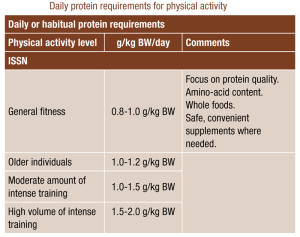Athletes have unique dietary needs, particularly when it comes to protein consumption. Protein is an essential macronutrient that plays a crucial role in muscle repair, growth, and maintenance. However, determining the optimal protein intake for athletes has been a topic of debate and research.
Importance of Protein for Athletes
Protein is especially important for athletes due to the high demands they place on their bodies during training and competition. It helps support the repair and growth of muscle tissue, enhances recovery after intense exercise, and aids in the prevention of injuries.
Protein Requirements for Different Athletes
The protein requirements for athletes can vary depending on several factors, including the type of sport, training intensity, duration, and individual goals. Endurance athletes, such as long-distance runners or cyclists, may have different protein needs compared to strength and power athletes, like weightlifters or sprinters.
Recommended Daily Protein Intake for Athletes
According to evidence-based guidelines, athletes involved in moderate exercise, such as recreational sports, are recommended to consume approximately 1.2 to 1.4 grams of protein per kilogram of body weight. For endurance athletes, the range increases to 1.2-1.6 grams per kilogram of body weight. On the other hand, strength and power athletes should aim for an intake of 1.6-2.0 grams per kilogram of body weight.
Timing and Distribution of Protein Intake
In addition to the total daily protein intake, researchers have highlighted the importance of timing and distribution of protein throughout the day. It is recommended that athletes consume adequate protein at each meal and snack to optimize muscle protein synthesis. Spreading protein intake evenly across meals can help maximize muscle protein synthesis rates.
Sources of Protein for Athletes
Athletes can obtain protein from various sources, including both animal and plant-based options. Animal sources, such as lean meats, poultry, fish, eggs, and dairy products, provide high-quality protein with all essential amino acids. Plant-based sources like legumes, tofu, tempeh, quinoa, and nuts are also rich in protein but may require a combination of different food sources to ensure adequate amino acid profiles.
Considerations for Vegan Athletes
Vegan athletes, who rely solely on plant-based sources of protein, need to pay careful attention to their protein intake and ensure a balanced amino acid profile. Combining different plant protein sources, such as consuming legumes with grains or seeds, can help vegans meet their protein needs.
The Role of Supplements
While it is possible to meet protein requirements through a well-balanced diet, some athletes may find it challenging to consume adequate amounts of protein solely from food sources. In such cases, protein supplements can be a convenient option. Whey protein, casein protein, and plant-based protein powders are popular choices among athletes. However, before incorporating supplements, it is recommended to consult with a registered dietitian or sports nutritionist to ensure appropriate usage and dosage.
Protein plays a vital role in the diet of athletes, helping to support optimal performance, muscle recovery, and injury prevention. Evidence-based guidelines recommend athletes to consume adequate protein based on their specific sport, training goals, and body weight. As with any dietary consideration, it is essential for athletes to consult professionals to develop personalized nutrition plans that meet their specific needs.




